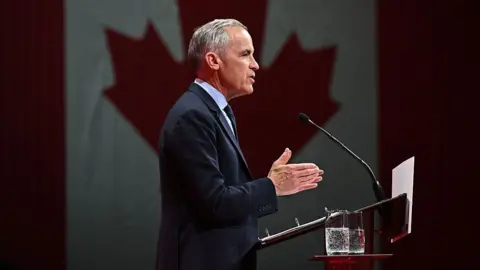### Introduction to Mark Carney’s Stance on Economic Relations with the US
The recent election of Mark Carney as Canadian Prime Minister marks a paradigm shift in global economic discourse, particularly in the context of US-Canada relations. Carney, who has been a significant figure at the Bank of England, is now positioned as a formidable leader seeking to challenge and counterbalance the economic policies of former President Donald Trump. His election comes with the global community keenly watching whether he will pursue a collaborative strategy with the United States or maintain a more confrontational approach.
### Carney’s Perspective on Tariffs and Trade
Despite initial expectations that Carney would quickly seek peace negotiations with President Trump following his election victory, he has instead taken a firm stance against the detrimental tariffs imposed by the Trump administration. In various statements—including speeches made during his victory celebrations and interviews—Carney has demonstrated a commitment to uphold his electoral mandate, emphasizing that the United States’ current approach is fundamentally flawed. He believes that these tariffs are likely to backfire, harming American consumers and companies while inadvertently stimulating Canadian economic independence.
By publicly criticizing the Trump administration’s policies, including the controversial scrutiny of major corporations like Amazon, Carney underscores his belief that the tariffs are misguided. He argues that such an administration might be metaphorically “shooting itself in the foot,” contrary to the traditional views held by countless economic experts and commentators.
### Carney’s Economic Strategy and Alliances
As Carney assumes office, the looming threat of economic repercussions from US tariffs cannot be ignored. With approximately 75% of Canadian exports directed towards its southern neighbor, the gravity of the situation forces Carney to pivot towards a diversification strategy in trade. He expressed a vision where Canada would not only assert its agency in economic partnerships but also nurture new alliances with global players including Europe and the UK.
This diversification strategy, articulated during his campaign, highlights a shift in Canadian economic policy toward a more autonomous path, reducing reliance on the US market. For Carney, fostering economic ties with countries outside of North America becomes crucial in diluting the potential impact of Trump’s tariffs on Canada’s economy.
### The Future of US-Canada Relations
Carney’s resistance to willingly conforming to US demands signifies a marked departure from traditional diplomatic overtures. While he maintains a hope for a “win-win” partnership with the US, he insists that such negotiations must be based on Canada’s terms. His administration’s approach indicates a readiness to confront the US if necessary, while still holding the door open for constructive dialogue. He stated emphatically, “We’ll have a partnership on our terms,” signaling confidence in Canada’s negotiating power.
Moreover, the potential for a free trade agreement between Canada and the UK might be expedited under Carney’s leadership, which he identified as a feasible move. He also explored defense collaboration and discussions regarding Canada’s rich critical mineral resources, all of which serves to augment Canada’s international standing while solidifying its economic positioning as a leader in the G7.
### Conclusion and Future Implications
With a significant G7 summit scheduled to take place in Alberta just before Trump’s pause on tariffs ends, the global economic landscape may face a decisive change. Carney’s proactive positioning may set the stage for not just Canada’s economic future but could also have wider implications within the G7. His statements suggest a profound belief that the era of American economic hegemony is fading, a notion that he intends to build upon within an international framework.
As discussions move forward, all eyes will be on Kananaskis in June, as this gathering could be pivotal for shaping the future of global economics and US-Canada relations. Carney’s leadership is not just about mitigating tariffs; it is about redefining Canada’s role on the global stage amidst changing dynamics.



